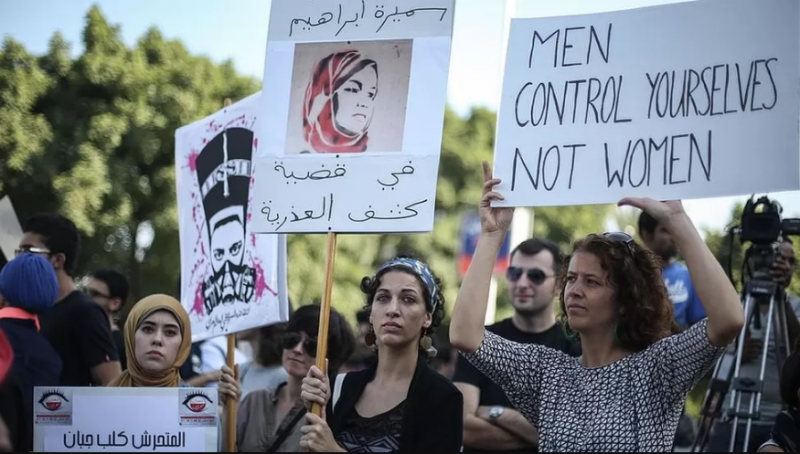
Egypt: The flood of violent crimes against women in Egypt has exposed weaknesses in social and legal safeguards that expose female residents to assault and harassment, according to victims and activists.
The most famous case involved the murder of 21-year-old student Naira Ashraf, who was stabbed 19 times in front of a university in Mansoura, north of Cairo, in late June. It turns out that Mohamed Adel, who was convicted of her murder, had been following her for almost a year after she turned down a marriage proposal.
Her passing attracted media attention from across the Middle East and shed light on other violent crimes against women in Egypt. The backlash also stemmed from a 2020 campaign against elite sexual misconduct in Egypt, which was partly inspired by the global "#MeToo" movement.
Because cultural norms often discourage abused women from reporting their abuse, activists claim that it is difficult to measure the extent of gender-based violence in Egypt. Most of the cases are believed to be unreported.
According to a study by the non-governmental Adrak Foundation for Development and Equality (EFDE) in Egypt, media reports and public prosecutor's statements recorded 813 crimes of violence against women and girls in 2021, up from 415 in 2020.
Victims and lawyers claim that those who sought help from the authorities did not always get it.
Ashraf's family lawyer, Khalid Abdel Rahman, told Reuters that Adele stalked Ashraf, publicly threatened him, using photos of his face to digitally convert fake social media accounts to pornographic images, and Recited death threats.
However, he claimed that Ashraf had dropped the case after reporting the threat to the cybercrime police unit and filing two restraining orders.
“Naira would not have been killed,” he said, “if these police reports had had proper legal procedures and action would have been taken against the accused person.”
In Ashraf's case it was "very difficult" to prove that the fake accounts belonged to the accused, according to a judicial source familiar with the investigation, who asked to remain anonymous. Also, testing takes time.
The prosecutor's office cited its public statements when questioned by what critics claimed was a failure to enforce laws protecting women.
Prosecutors reaffirmed their firm response to "all forms of crimes of violence and aggression, particularly against women and youth," in a statement released ahead of Adele's trial. An inquiry for comment was not responded to by the Interior Ministry.
Less than two months after the murder of Naira Ashraf, another university student, Salma Bahgat, aged 20, was stabbed to death at least 15 times in Zagazig, a town between Cairo and Mansoura . He declined a proposal of marriage from a fellow student, and has since been accused of murder.
The suspect's criminal trial is due to begin in early September.
Within days of the crime, a court in Mansoura found Adele guilty of premeditated murder amid public outcry. In July, another court upheld his death sentence.
According to Lobna Darvish, a gender expert at the non-governmental organization Egyptian Initiative for Personal Rights, the state is trying to set an example by imposing harsher punishments on cases that spark public outrage.
He added, “But we ignore the causes of violence against women as well as violence taking place inside and outside the home.
Adele's conviction court asked lawmakers to amend the law to allow television coverage of her execution.
One issue is the lack of legislation that makes violence against women a crime and can prevent a crime before it happens, according to Antesar Al Saeed, an attorney and director of the Cairo Foundation for Development and Law, an independent civil society organization.
According to Al Saeed, social pressure against women who report crimes remains a deterrent.
In the case of Mary Magdy, a 35-year-old woman who reported her husband to the police for four counts of violent assault, such pressure was evident.
Magdy told Reuters that although she was called in for questioning, police and prosecutors initially only proposed a husband-wife reconciliation in response to her allegations.
Family members urged him to drop his grievances, but the public prosecutor responded when he released surveillance footage of a beating earlier this year.
Within a week, her husband was taken into custody and given a one-year prison sentence.
When she was released, Maggie claimed that she would still be concerned for her life and the lives of her daughters. "I want protection," Maggie told Reuters. "I am terrified at the thought of him being released."
He cannot get a divorce because he is a minority Coptic Christian in Egypt.
Her lawyer, Saeed Faiz, said there was no legal way out that would protect her.
These Arab states gather in Egypt to discuss all-round cooperation
Israeli declines appeal to free Palestinian prisoner in hunger striker
41 victims of the Cairo Coptic church fire are mourned by Egyptians at funeral